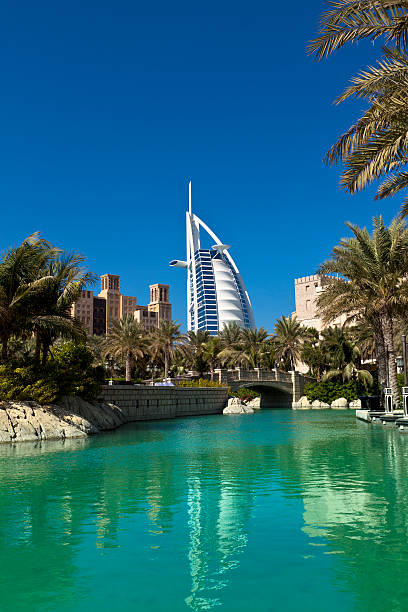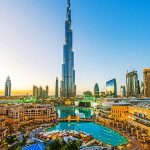
Why Dubai is Famous: A Global Icon of Innovation, Luxury, and Opportunity
Dubai, the largest city in the United Arab Emirates (UAE), has transformed over the last few decades from a small desert port town into a global metropolis that draws millions of visitors and investors annually. Its rise to prominence has been fueled by visionary leadership, innovative architecture, world-class infrastructure, and a strategic location at the crossroads of Europe, Asia, and Africa. Today, Dubai is a symbol of luxury, technological advancement, and cultural diversity. This article explores the reasons why Dubai has become a global icon and why it remains one of the most famous cities in the world.
1. Visionary Leadership and Strategic Development
Dubai’s success can be largely attributed to its leadership and their long-term vision for economic diversification. When Sheikh Mohammed bin Rashid Al Maktoum ascended to power in 2006, he articulated a vision for Dubai to become a global city and a hub for commerce, tourism, and finance. He recognized that the city could not depend on oil forever, and hence, began investing heavily in other sectors such as real estate, tourism, and finance. Under his leadership, Dubai embarked on large-scale projects that would shape the city’s future and attract international attention.
The government’s proactive approach in investing in infrastructure, technology, and business-friendly policies has made Dubai a global player. From building monumental skyscrapers like the Burj Khalifa to transforming the waterfronts with artificial islands such as Palm Jumeirah, the leadership’s vision has shaped Dubai’s identity as an innovative and forward-thinking city.
2. Architectural Marvels and Iconic Landmarks
Dubai is perhaps best known for its mind-boggling architectural feats, which continue to push the limits of engineering and design. The city’s skyline is dominated by some of the world’s most recognizable and luxurious buildings, making it a prime example of modern urban development.
The Burj Khalifa, the tallest building in the world at 828 meters, is perhaps Dubai’s most iconic structure. It symbolizes the city’s ambition and engineering prowess. Visitors flock to the observation deck on the 148th floor to get panoramic views of the city and beyond, cementing the Burj Khalifa as one of the world’s most visited landmarks. If you’re planning a visit, make sure to buy top Burj Khalifa tickets to experience this marvel in all its glory.
Not far behind in terms of recognition is The Palm Jumeirah, an artificial island shaped like a palm tree. This luxury residential and resort development, complete with upscale hotels like Atlantis The Palm, has made Dubai synonymous with extravagant living and lavish lifestyles. The city is also home to architectural innovations such as the Burj Al Arab, the world’s most luxurious hotel, which is designed to resemble a sail, and the Dubai Opera, a stunning venue for performing arts.
These architectural feats not only put Dubai on the map but also make it an aspirational destination for tourists, investors, and architects from all over the world.
3. Luxury Shopping and Retail Experiences
Dubai has earned a reputation as one of the most luxurious shopping destinations in the world. The city is home to the Dubai Mall, one of the largest shopping centers on the planet, with over 1,200 retail stores, a vast indoor aquarium, an ice rink, and countless dining and entertainment options. Tourists and residents alike flock to the mall to indulge in high-end brands, ranging from Gucci and Louis Vuitton to more niche luxury labels.
Dubai also hosts an annual Shopping Festival, which has become a cultural phenomenon. The Dubai Shopping Festival (DSF) attracts visitors from around the globe who come to take advantage of massive discounts, attend live performances, and enjoy spectacular fireworks displays. The event showcases the city’s commitment to creating unique and exciting experiences for tourists and shoppers.
In addition to the luxury malls, Dubai is home to gold souks, traditional markets where visitors can purchase gold, jewelry, and precious metals at competitive prices. The Dubai Gold Souk is a must-visit for tourists looking to experience the cultural side of the city while also indulging in the luxury lifestyle.
4. Tourism and Entertainment Hub
Dubai’s booming tourism industry is another key factor that contributes to its fame. The city has quickly become a global tourist hotspot, attracting visitors from all corners of the globe who come to experience its unique blend of cultural attractions, luxury resorts, and entertainment offerings.
Tourists are drawn to Dubai for its world-class hotels, including The Atlantis, The Palm, The Address Boulevard, and the ultra-luxurious Burj Al Arab. These properties offer a level of comfort and service that sets new standards for the hospitality industry. The city’s beaches, such as Jumeirah Beach, provide an ideal setting for visitors to relax, while luxury yachts and private beach clubs cater to those who want a more exclusive experience.
In addition to luxury, Dubai offers thrilling experiences such as indoor skiing at Ski Dubai, a massive indoor ski slope in the Mall of the Emirates, and a variety of desert adventures, including dune bashing, camel rides, and desert safaris. The Dubai Desert Conservation Reserve offers an opportunity to experience the natural beauty of the desert, making the city an exciting mix of modernity and tradition.
Dubai is also home to major cultural events, including the Dubai International Film Festival (DIFF), the Dubai World Cup (the richest horse race in the world), and concerts by world-renowned artists. The city’s commitment to providing diverse entertainment options ensures it remains a prime destination for international tourists.
For those planning a trip to Dubai, it’s always a good idea to buy Dubai tickets in advance for popular attractions to avoid long waiting times. With so much to see and do, planning ahead ensures a smooth and enjoyable experience.
5. Business and Financial Hub
Dubai is not only a tourism and leisure destination; it is also a major business and financial center. The Dubai International Financial Centre (DIFC) is one of the most important financial hubs in the Middle East, offering a robust legal and regulatory framework that appeals to international businesses and investors. The DIFC hosts numerous global financial institutions, law firms, and investment banks, making it a critical node in the global financial system.
The city’s strategic location, ease of doing business, and tax advantages (such as no income tax) have helped attract multinational companies to set up their regional headquarters in Dubai. As a result, the city is home to numerous expatriates and entrepreneurs who work in industries ranging from technology and finance to logistics and trade.
Moreover, Dubai is famous for its innovative initiatives, such as the creation of free zones, which offer tax exemptions and regulatory benefits to businesses in sectors like technology, media, and healthcare. The success of Dubai’s business environment has attracted attention from around the world, positioning it as a city that is not only about luxury but also about opportunity and growth.
6. Cultural Diversity and Tolerance
Dubai is renowned for being a melting pot of cultures, with people from all over the world calling the city home. The UAE’s openness to expatriates has created a dynamic and diverse environment where people of various nationalities live and work together. According to some estimates, nearly 85% of Dubai’s population are expatriates, contributing to the city’s cultural vibrancy.
The city is home to a wide range of cultural institutions, such as the Dubai Museum, the Al Fahidi Historical Neighborhood, and the Dubai Opera. These institutions celebrate the heritage of the UAE while also embracing modern art, music, and culture from around the world.
Dubai’s tolerance towards different cultures, religions, and lifestyles makes it an attractive destination for people seeking a cosmopolitan environment. Religious freedom is also evident, with churches, temples, and mosques coexisting harmoniously, reflecting the city’s inclusive values.
7. Cutting-Edge Technology and Innovation
Dubai is known for its embrace of technology and innovation, making it one of the most futuristic cities in the world. The city is home to Dubai Internet City and Dubai Silicon Oasis, both of which are hubs for technology companies and startups. These areas foster innovation and entrepreneurship, positioning Dubai as a leader in the tech industry.
Additionally, Dubai has made significant strides in areas such as artificial intelligence, robotics, and sustainable technologies. The Dubai Smart City initiative aims to integrate technology into every aspect of urban life, from transportation and energy efficiency to security and communication.
The government’s commitment to innovation is further exemplified by the establishment of Dubai Future Foundation, which seeks to explore new technologies and ideas that can shape the city’s future. Dubai is also exploring the potential of blockchain and cryptocurrency, with projects such as Dubai Blockchain Strategy, which aims to make Dubai the first city fully powered by blockchain technology by 2020.
Conclusion
Dubai’s fame is a result of its remarkable transformation from a desert outpost to a global icon of luxury, technology, and opportunity. The city’s visionary leadership, impressive architectural feats, world-class shopping and entertainment offerings, and business-friendly environment have all contributed to its rise as one of the most famous cities on the planet. Dubai’s blend of tradition and modernity, cultural diversity, and technological advancements ensures that it will continue to capture the world’s imagination for many years to come. Whether for business, leisure, or innovation, Dubai remains at the center of global attention and an aspirational destination for millions worldwide.





Leave a Reply